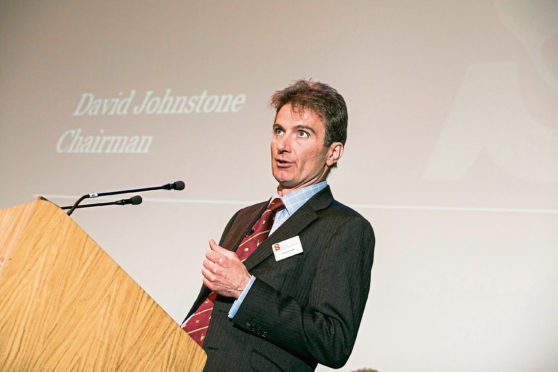David Johnstone has been reappointed chairman of Scottish Land and Estates (SLE) for another year.
Mr Johnstone, who owns and runs Annandale Estates near Lockerbie in Dumfries-shire, was re-elected to the role at the organisation’s annual general meeting at Perth Racecourse yesterday.
The other members of the SLE top team are vice-chairman for policy, Mark Tennant, of Innes Estate, near Elgin, and vice-chairman for operations, Dee Ward, of Rottal Estates, near Kirriemuir.
Speaking following his re-election, Mr Johnstone praised the jobs and prosperity which SLE member businesses continued to provide to countryside communities.
“There is little doubt that the continuing political uncertainty has been a challenge but it has not prevented land-based businesses from contributing to Scotland rural economy,” said Mr Johnstone.
“We have provided thousands of direct jobs in a range of industries, supported indirect employment in supply chain trades and professions, and accordingly helped to maintain demand for the public services that communities need to remain viable.
“Not only that, we have maintained and enhanced the environment that is central to Scotland’s visitor economy and added to our natural capital for future generations.”
He challenged rural businesses to grow that activity further.
“Brexit presents both opportunities and challenges, not least in terms of our future trade relationship with Europe,” added Mr Johnstone.
“Yet, our rural businesses are a resilient force for good – and we will continue to make the case with decision-makers for a policy and legal framework that allows business to keep providing these priceless benefits.”
SLE executive director, Sarah-Jane Laing, said: “Our vision is to have the true contribution of rural land-based businesses recognised and valued both publicly and politically.
“In order to achieve that, we need to have SLE working at its best operationally.
“We have grown our staff team considerably over the past year and this has led to a better service for our members and also a substantial increase in the engagement we can enjoy with government and stakeholders.
“There are more and more demands being placed on land-based businesses – social, economic and environmental – and it is vital that we provide the best advocacy possible on their behalf to represent their collective voice,” added Ms Laing.
